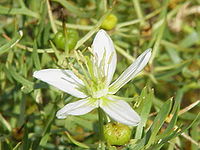
Photo from wikipedia
In this work, we propose a general methodology to assess the bioactive potential (BP) of extracts in the quest of vegetable-based drugs. To exemplify the method, we studied the anticancer… Click to show full abstract
In this work, we propose a general methodology to assess the bioactive potential (BP) of extracts in the quest of vegetable-based drugs. To exemplify the method, we studied the anticancer potential (AP) of four endemic species of genus Hypericum (Hypericum canariense L, Hypericum glandulosum Aiton, Hypericum grandifolium Choisy and Hypericum reflexum L.f) from the Canary Islands. Microextracts were obtained from the aerial parts of these species and were tested against six human tumor cell lines, A549 (non-small-cell lung), HBL-100 (breast), HeLa (cervix), SW1573 (non-small-cell lung), T-47D (breast) and WiDr (colon). The methanol–water microextracts were evaluated further for cell migration, autophagy and cell death. The most promising bioactive polar microextracts were analyzed by UHPLC–DAD–MS. The extraction yield, the bioactivity evaluation and the chemical profiling by LC–MS suggested that H. grandifolium was the species with the highest AP. Label-free live-cell imaging studies on HeLa cells exposed to the methanol–water microextract of H. grandifolium enabled observing cell death and several apoptotic hallmarks. Overall, this study allows us to select Hypericum grandifolium Choisy as a source of new chemical entities with a potential interest for cancer treatment.
Journal Title: Molecules
Year Published: 2022
Link to full text (if available)
Share on Social Media: Sign Up to like & get
recommendations!